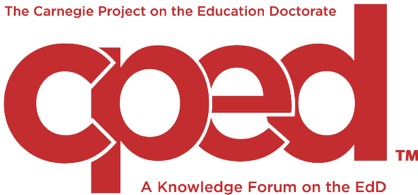Educational Leadership in Higher Education, EdD
 The Doctor of Education in Educational Leadership in Higher Education is an accelerated three to three-and-half year advanced practitioner program. It is intended for those working within higher education as faculty, student affairs educators, academic affairs administrators, enrollment management professionals, collegiate athletics, or those in education-adjacent careers such as college access or adult education. Courses are offered in weekend cohort format through synchronous online instruction. The EdD program offers a distinct higher education curriculum as a member of the Carnegie Project for the Education Doctorate (CPED). This national recognition demonstrates faculty and program commitment to equity, ethics, and social justice
The Doctor of Education in Educational Leadership in Higher Education is an accelerated three to three-and-half year advanced practitioner program. It is intended for those working within higher education as faculty, student affairs educators, academic affairs administrators, enrollment management professionals, collegiate athletics, or those in education-adjacent careers such as college access or adult education. Courses are offered in weekend cohort format through synchronous online instruction. The EdD program offers a distinct higher education curriculum as a member of the Carnegie Project for the Education Doctorate (CPED). This national recognition demonstrates faculty and program commitment to equity, ethics, and social justice
With a grounding in the conceptual underpinnings of the practice of higher education, the EdD in Educational Leadership in Higher Education provides candidates with knowledge base & skillsets conducive for the effective organizational administration, policy development, strategic innovations, and social justice advocacy as related to post-secondary institutions. The candidates will emerge as ethical and socially responsive professionals who can connect theory and research to successfully operate within the diverse, social, political, educational, and organizational contexts of their institutions and academic community.
Course Delivery & Format
The EdD in Educational Leadership in Higher Education is offered as an online accelerated three to three and half year (3-3.5 years) doctoral program with two sessions per semester. Students take courses in each session which are each eight weeks in the fall, spring, and summer semesters.
The program is intentionally designed for working professionals to advance their career in higher education administration or within the professoriate:
- Courses meet alternating weeks in a Friday evening-Saturday morning format Therefore, each course will meet on 4 separate Friday evening-Saturday morning synchronous meetings within the 8-week accelerated format.
- The program curriculum is purposively designed as a fluid-cohort in which students take courses with the same students in a structured sequence throughout the duration of the program.
- The curriculum is delivered in a hybrid or “HyFlex” format in which there are synchronous course instruction supplemented by asynchronous assignments and online learning.
- Online course assignments may include research, case studies, discussion boards, or video reflections.
- Online accessibility allows students to accommodate their schedules and complete necessary coursework in between the course meetings.
International Students
The EdD in Educational Leadership in Higher Education accommodates in-person, classroom-based learning and instruction for international students. We have welcomed students from around the world including those from China, India, or other regions such as Eastern Europe or Africa. Our domestic EdD program is comprised of more than 20% international students which offers an internationalized and enriching learning community. Our full-time faculty are available to individually support international students in their adjustment and transition as they learn about the American higher education system. Our curriculum even features one specific course focused on the internationalization of postsecondary education across the globe. For international admissions, please visit our Office of International Affairs to learn more about specific admission requirements
Program Distinction
The curriculum for the EdD in Educational Leadership in Higher Education is distinctive in its focus on “core four” domains of leadership competency that permeate across the program and follows the Carnegie education doctorate for the dissertation in practice. The curriculum has been intentionally framed by (1) educational equity, (2) inclusive leadership & practice; (3) critical social justice; and (4) adult learning and development.
Educational Equity
The histories of higher education are explored through critical lenses and sociocultural contexts to advance educational equity. This provides a foundation to better understand the loosely coupled American system of postsecondary education of institutional types that support the diverse contemporary college students and communities. Students examine and critique historical and current practices in relation to their own professional experiences and social identities. Doctoral students will be able to assess the needs and interests of students to implement progressive and contemporary approaches which allow students, faculty, and staff to flourish in higher education.
Inclusive Leadership & Practice
Leadership theories are emphasized throughout the program to allow students to become reflective scholar-practitioners. Inclusive leadership approaches are promoted to support humanizing higher education which allow students, faculty, and staff to find belonging within the academic community. Administrative cultures and theory, educational policy development, and university organizational models are explored. This supports doctoral students to promote inclusive leadership theory and approaches to serve as transformative leaders and agents of equitable change on their respective campuses or within their areas of influence.
Critical Social Justice
Critical theories and frameworks are emphasized to allow students to understand how to interrogate systems of oppression, power, and privilege that differently facilitate marginality across intersecting identities. Doctoral students will be able to develop their own nuanced approach towards critical praxis informed by the use of critical education theories.
Adult Learning & Development
Theories and models of college student development and learning are explored to demonstrate the impact of the college experience on adult learning and identity development. These processes converge with systemic barriers of individual student persistence which can inform institutional retention efforts. Doctoral students will be able to apply current research and theory to connect issues of college access and enrollment management.

